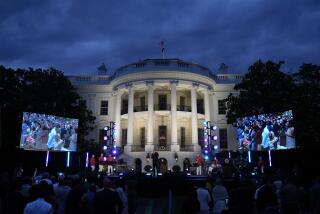Canceling History in the Name of Racial Harmony
- Share via
When Inglewood High School’s principal this year canceled the school’s observances of Black History Month and Cinco de Mayo because of chronic black-Latino tensions on campus, a question some of us had silently asked for years was suddenly pressing: Who needs Black History Month, anyway? Granted, principal Lowell Winston ended Cinco de Mayo celebrations, too, but the blow against Black History Month struck deep and sent a clear message that what had been formulated as an early but enduring expression of the fierce pursuit of civil and human rights was politically expendable. Many proponents of multiculturalism--their numbers are growing at an alarming rate--probably regard the two observances as interchangeable. But without casting any aspersions at Cinco de Mayo, its status as a full-blown celebration would likely be impossible without the precedent of Black History Month.
On a gut level, it’s understandable that Winston would cancel events that promised only to compound racial tensions at a campus infamously known since 1990 for its simmering interethnic hostilities, which were first ignited at a Cinco de Mayo assembly. Yet, it also felt a bit like the Grinch stealing Christmas, stripping the tree and making off with presents in the middle of the night because the Grinch himself had no use for the holiday. Black History Month is not as sacred or immutable as Christmas--in fact, it’s rather arbitrary--but what it represents in the furiously shifting racial and political landscape of Los Angeles, and the racial landscape of the country at large, is worth preserving: black solvency. By that I mean not merely political solvency, but a larger sense of intragroup empathy, a general well-being expressed through sustained connectedness and cooperation that gives rise to political fortune, among many other things.
That there really is no such thing is not the point. The ideal, and encouraging aspirations to the ideal, is. Black History Month gives us a solvency by stringing together all the accomplished and admirable characters in our history like so many Christmas lights and wrapping them around the thorny center of our collective being. The lights may be selective information, may smack of self-congratulation, but so what? Black people could certainly do with more legitimate occasions for self-congratulation.
To be sure, Black History Month, like affirmative action, is not enough. The sum total of the month--the school handouts, the essay contests, the product placements of those cloying, gospel-inflected McDonald’s commercials--may all only be a butterfly wing’s flap in the right direction. But it is a direction in which we constantly need to be pointed, a life-giving sky that is miles and miles above our heads but we too often don’t remember is there.
Yet, Black History Month is an exquisitely tortured idea. To commemorate black Americans is certainly just, but doing so also reinforces black people’s position of being the dispossessed outsider: at best, the iconic (jazz, language, poetic endurance); at worst, the reviled Other (no explanation needed). The question of why black history isn’t taught as part of American history should die in your throat as you realize that, like most other things African American, it was never meant to be mainstreamed.
When educator Carter G. Woodson created Negro History Week, he was doubtless thinking about the need of black people to coalesce around each other, not only around their achievements, but also around their pain, which, though hardly something Woodson advertised, is implicit in the very fact that Negro History Week was needed to affirm blacks as something more than a series of omissions, distortions and, at best, blank pages in history books.
I had to force myself to think this whenever I thought Black History Month was a bit quaint and ultimately somewhat undignified: black worth as a charitable cause, a monthlong Jerry Lewis telethon. Suffering from the late-century incarnation of that insidious black disease known as double consciousness, I continually have to separate the goods from the packaging, the flesh-and-blood thing from the ever more sophisticated camera that records its image. To that end, the relevant question is how we view Black History Month today, particularly in the context of blacks living not so much with whites, but with Latinos and other immigrant groups of color. Yet, these changes in backdrop do not alter the fact that blacks are still disproportionately disenfranchised, still much in need of the affirmation afforded by Black History Month.
You might not think so, given all the chatter about new-paradigm politics stressing the importance of no color lines and declaring the imminent death of any and all black--and Latino, for that matter--agendas, which are said to have outlived their usefulness. In a perfect America, that would be true, but the truth is, this new paradigm does not apply equally to all ethnicities, and black folks seem to be saddled with the heaviest burden of proof of colorblindness.
It’s odd how spotlighting blackness makes some people squirm, to the point where they complain about something like Black History Month upsetting our delicate new racial balance by setting blacks “apart.” But why are other groups so easily granted--rightfully granted--their ethnic space? The daily papers are filled with stories about the ascendancy of Latino culture and politics, and no one grouses about separatism, because Latino ascendancy is a natural outgrowth of a rising Latino population.
Black people, on the other hand, are an ethnic group told to put away childish things: It is wrongly assumed that because they have lost numbers and percentages, not to mention coherent leaders, they have lost the moral argument for inclusion at the tables of power. The moral argument is still alive, but it is unfortunately a truth without a spokesperson; it only occasionally attaches itself to a cause or an event like Black History Month, which, in illuminating our evolution, also illuminates how much more we must evolve before we can phase out the observance altogether. Cutting the observance at will, like an unnecessary expense in a budget, speaks to how much we regard black history not as essential, but as decorative.
Principal Winston may have figured that killing Cinco de Mayo festivities would balance the scales. But the complex fact of the matter is, the two observances do not represent the same things, though they are related in spirit and in the sense that the institution of Black History Month promoted mainstream recognition of Cinco de Mayo and other ethnic festivals. Cross-cultural activities are necessary, laudable; cross-cultural equations are shortsighted and too often give the shortest shrift to African Americans. Black History Month is hardly the salve for some real psychic and social ills plaguing black Americans, but it does articulate what gets articulated less and less: Blacks still occupy a unique and often terrible place in American society. Cancel that.
More to Read
Sign up for Essential California
The most important California stories and recommendations in your inbox every morning.
You may occasionally receive promotional content from the Los Angeles Times.













